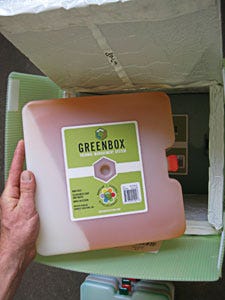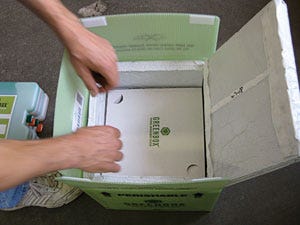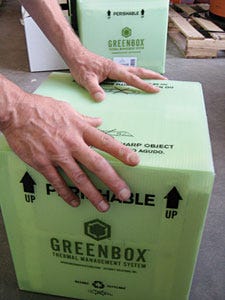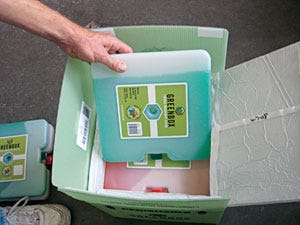Walmart’s New Pharma Packaging Survives High Temperatures and Cuts Costs
March 11, 2015
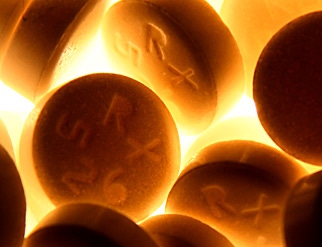
|
Phase-change material E-Packs,an outer shipper and insulation panels combine as the GreenBox thermal-management packaging system, which acts as an enviro-friendly way to ship temperature-sensitive medications and keep them 'in spec.' |
As powerful as Walmart is, it can't change the weather. That's why James Soucey, director of clinical services for Walmart's Specialty Pharmacy in Lake Mary, FL, had a problem shipping to the state of Hawaii. The state's logistics and warm temperatures were wreaking havoc on the company's mail-order shipments of high-value, temperature-sensitive prescription drugs to patients in Hawaii with special health conditions or complex, chronic conditions. Walmart Specialty Pharmacy provides prescription services and follow-up care directly to individuals throughout the country with conditions including arthritis, growth disorders, hepatitis, HIV, multiple sclerosis, oncology, psoriasis and much more. Transporting the medications to a patient's home, office, family member or physician's office in all 50 states via common carrier was posing some challenges, but especially in the 50th state.
Patients were receiving shipments that were too warm, which denaturized some of the protein-based biological products, and sometimes rendered the medications ineffective.
Twofold challenge
This meant that the packages had to be reshipped if products were “spoiled,” and Walmart Specialty Pharmacy had to absorb the cost—as much as $1,500 for a single package.
Actually, the problem was twofold. First, common carriers that transport the medications were occasionally holding the Hawaiian shipments at a main hub until there were enough packages to warrant a delivery to outlying islands. This delay was causing shipments to exceed the cold-chain capacity of the packaging.
The second issue was the availability of patients to receive the shipments. Even though the Specialty Pharmacy staff was diligent in contacting the intended recipients to ensure they would be home when the drugs were set to arrive, sometimes things came up, people weren't home when they said they would be, and consequently, the package containing the medication would, perhaps, sit on a doorstep for hours at a time, often in the hot sun. This would also exceed the packaging's temperature-insulating capabilities.
“We saw an increasing number of 'reships,' sometimes at a cost of as much as $1,500 for new medications,” recalls James Soucey, director of clinical services for Walmart Specialty Pharmacy. “We needed a solution.”
The logistics/temperature conundrum wasn't just isolated to Hawaii. Soucey says it was having a similar experience in Alaska, with somewhat different logistic depot procedures and much different temperature extremes.
Freezing proteins can be as damaging as overheating them. And temperature becomes an issue anywhere in the U.S. where it gets hot in the summer and cold in the winter.
Soucey reassessed Walmart Specialty Pharmacy's packaging method for temperature-sensitive pharmaceuticals. This included not only cold-chain products that require maintenance of 2 to 8 deg C, but also products in controlled-room temperatures that require maintenance of 20 to 25 deg C.
One example of the latter group is GLEEVEC®, an oncology drug that can cost roughly $8,000 for one therapy cycle. If GLEEVEC is subjected to extreme heat, the medication capsules can melt together like gummy candy.
More than 110,000 packs/yr
Shipping more than 110,000 temperature-sensitive packages each year, Walmart Specialty Pharmacy had used a typical package comprising a corrugated outer shell with foam cushioning and water-based gel packs. The price of the packaging was right, but the company admits, the structural combination wasn't always effective.
Walmart Specialty Pharmacy also tried more expensive coolers and prequalified polyurethane shippers, but found that these options performed less satisfactorily than the original packaging, it states.
While searching for an alternative, Soucey says that Walmart Specialty Pharmacy also wanted to improve its package's sustainability and environmental aspects while reducing waste, both on his end and on the customer's end.
He remembered reading about a reusable package called Greenbox™, made by Entropy Solutions (www.entropysolutionsinc.com). Greenbox packaging maintains a cold-chain prescription's temperature for four days and an ambient-temperature prescription for more than five days. Soucey tried it, and the results saved Walmart Specialty Pharmacy 50 percent in shipping costs.
First line of defense
|
Keeping its cool (or warmth, depending in the product) the GreenBox maintains a temperature for days. It's also reusable and recyclable. |
Greenbox packaging comprises a tinted-green, reusable, outer HDPE shipping container that resembles a mailing container. Resistant to moisture, crushing and scuffing, the outer plastic-corrugated container is practically impervious to repeated exposure to packing tape. It houses a set of reusable/recyclable Thermal-Lok™ insulation panels, made using recycled carbon silica and what Entropy refers to as a nanotechnology-based manufacturing process in a patented, proprietary packing protocol that provides them with an R value of 40.
Entropy Solutions' president Eric Lindquist claims that the panels have a thermodynamic insulating capacity that's 10 times greater than EPS or PU foam.
While the Thermal-Lok panels are the first line of defense against the heat or cold the package is trying to impede, key to the technology is the panels' use in combination with a specially designed phase-change material that moderates temperatures by either absorbing or releasing energy.
Secret sauce
Replacing conventional silica gel packs, the phase-change material, which Entropy affectionately refers to as the “secret sauce,” comprises what it refers to as a vegetable oil-based phase-change material (PCM) that protects the medication from either heat or cold, regardless of the outside weather. Contained in a flat rigid E-Pack, or in the case of the new Inflater Pack (see below), clear pillow pouches made of a proprietary film, the PCM can consist of a combination of patented materials. In a typical Greenbox, two sets of two different phase-change materials simultaneously absorb and release heat; while one E-Pack liquifies, the other solidifies, providing a “thermostat effect.” This happens continuously until the package reaches its destination.
Explains Lindquist, “Entropy nonpetroleum-based, phase-change material is completely safe for humans and the environment. Initially, PCMs behave like sensible heat storage (SHS) materials; their temperature rises as they absorb heat.
Unlike conventional sensible heat-storage materials, however, when these PCMs reach the temperature at which they change phase (either melting or solidifying temperature), they absorb/release large amounts of energy (hot or cold), at an almost constant temperature.
The PCMs will continue to absorb energy without a significant rise in temperature until all of the material is transformed to the liquid or solid phase (it depends if the PCM is protecting from heat or cold, Lindquist says). When the ambient temperature around a liquid material falls, the PCMs solidify, releasing their stored latent heat. If the temperature rises, they liquify.
Entropy offers 210 different types of phase-change materials that accommodate temperatures from -40 deg C to 180 deg C.
Besides medical products, the packaging can also be used to ship blood and biologics, for clinical trials, food and many other temperature-sensitive products (like pizza from New York to Los Angeles).
“Our focus is in the life-science industry,” Lindquist points out. “The closest thing to this material that most people would recognize is vegetable oil.”
The thermal-management container is capable of absorbing or releasing heat simultaneously. This means there's no more choosing and preparing for “summer” and “winter” packaging profiles, which can also cut costs.
Reusable and returnable
The proprietary materials are renewable, biodegradable, nontoxic and reusable. A single Greenbox can be used as many as 20 times through reclamation at one of Entropy's three facilities in North America and two in Europe that inspect and clean the boxes before shipping them back to customers like Walmart for re-use. “We typically have a reuse rate of 20 times,” affirms Lindquist. “That's conservative, as tracking reveals an average of 55 uses in a Fed-Ex/UPS circulation. Some customers have used their fleet of Greenbox containers more than 100 times.”
|
If the modular package is damaged in-shipment, the damaged component can be replaced with a new one, so a single Greenbox isn't disposed of all at one time. Also, a damaged Greenbox component can be is recycled into a new Greenbox component.
The packages can be returned by the patient to Walmart Specialty Pharmacy via common carrier. Walmart Specialty Pharmacy staffers hand-pack the medications in a highly temperature controlled environment for shipment. Once a customer receives their medication, they can use an enclosed return-address label and ship the package to one of Entropy's reclamation centers where it's inspected and cleaned according to FDA standards. The program with Walmart uses the U.S. Postal Service.
Because Greenbox keeps products at their proper temperatures, it can be shipped via ground transport versus overnight express, which can cut shipping costs significantly, by as much as 65 percent, according to Entropy. Soucey decided that the Greenbox packaging warranted further investigation, so in early 2008, he initiated a validation procedure that involved transporting temperature-monitored test shipments to customers in Hawaii and Alaska. After months of field tests, Walmart Specialty Pharmacy began using the Greenbox 12 for shipments to Alaska and Hawaii. The pharmacy staff utilized TempTales temperature monitors from Sensitech (www.sensitech.com) in each package to measure both ambient and medication temperatures throughout each product's shipment. Currently, Walmart Specialty Pharmacy is using Greenbox packaging for shipments to outlying areas, primarily Alaska and Hawaii. Inflater Packs are being used for specific drugs for all of the U.S.
“Our customers were happy to receive their medication at the right temperature in a Greenbox,” says Soucey. “When they have finished with the box, they can put it out on their doorstep for the postal carrier to pick up. There's no muss, no fuss.”
Walmart saves on shipping costs because the packaging helps the medication maintain the proper temperature for more than three days, so the pharmacies can ship via two-day or three-day air versus next-day air—a more expensive method. “It costs us about fifty-percent less to ship the Greenbox to states such as Hawaii and Alaska than it does typical paperboard packages,” Soucey explains. Walmart pharmacies are also able to ship larger amounts of payload in smaller overall containers, further reducing its distribution-related expenses.
The phase-changing material keeps medication at controlled-room temperature for the duration of its shipment. The box is insulated using recycled carbon silica Thermo-Lok panels that can be reused to keep items at controlled-room temperature. If a panel gets too hot, it can be reconditioned in the refrigerator for a few hours before wrapping it around the object. If it gets too cold, it can be left out at room temperature to warm before wrapping it around the product.
Inflatable pack for single doses
Satisfied with the Greeenbox results for cold-chain delivery, Soucey says that Walmart Specialty Pharmacy decided to approach Entropy about finding a package for shipping smaller amounts of product, or single doses of temperature-sensitive products. The Entropy team delivered the Greenbox Inflater Pack.
Now, when Walmart Specialty Pharmacy ships single doses of the oncology drug called Xeloda, it does so in a cushioned envelope that self-inflates to double its size when two spots are punctured on each side of the package. The pill bottle is wrapped in a “pillow-like” panel of E23 which is described as chemically altered, organic feedstock that forms either a solid or liquid phase to absorb or release heat.
This smaller, inflatable package maintains mandated temperature-sensitive (20 to 25 deg C), controlled room temperature (2 to 8 deg C) and refrigerated temperature ranges also for 24 to 48 hr. Shipping small quantitites of temperature-sensitive products like pharmaceuticals or clinical-trial medications can be tricky. The inflatable pouch is equipped with the same type of phase-change material as the Greenbox, and meets all regulatory requirements, the company says. Its temperature-regulating ability for narrow temperature ranges comes courtesy of the company's patented E23 phase-change materials, which it says are 100-percent safe for humans and the environment.
“Testing data shows the required Inflater Pack, with Entropy's phase-change technology, provides thermal protection required for controlled room-temperature medications and biologics,” says Rafik Bishara, Ph.D., chairman of the Pharmacetuical Cold Chain Intererst Group (PCCIG) and the Parenteral Drug Association (PDA).
“I consider this revolutionary because, simply, it works. No longer is the [product] integrity and quality or efficacy compromised in the distribution channels, as medications remain in the controlled room temperature range for the duration of their shipment.”
|
Capable of absorbing or releasing heat simultaneously, the container can be used for bothe summer and winter product applications, which can cut packaging costs. |
Entropy says that the Inflater Pack is also reusable and recyclable. Comprising an outer film pouch structure, the cushioning E23 panels and the organic phase-change packs, the pouch inflates when it is punctured with a sharp object, twice on the front and back.
Like the rigid Greenbox container, the Inflater Pack pouch can also save Walmart Specialty Pharmacy about 50 percent versus its previous packaging. Available in three versions, the Inflator Pack comes in 9x11- and 12x14-in. sizes that stay inflated for 24 or 48 hr.
Soucey says that before Walmart Specialty Pharmacy found the Inflater Pack, there just wasn't a viable solution for maintaining room temperature, though it was mandated by the Parenteral Drug Association's (PDA) Technical Report 39, as well as the U.S. Pharmacopeia (USP) Chapter &1079>.
“Approximately 15 to 20 percent of our medications must be kept at room temperature–if they get warmer or cooler, they lose their efficacy,” Soucey explains. “Keeping a medication at controlled-room temperature during shipment has been mandated by federal and state regulatory commissions for years, but it just wasn't possible, given the options on the market. Walmart did the very best it could, but now we have an increased level of confidence when we ship using the phase-change packs and the Inflater Pack.”
Guardian angel program
Soucey says that ensuring a package arrives at the right temperature and be refrigerated or remain at room temperature, is a responsibility not to be taken lightly. Consumers do check the temperature of their medications when they arrive, and if a prescription should fall “out of spec” in-transit, it could lead to health complications. For example, he says, if Tetracycline, a drug commonly used to treat skin conditions, falls out of spec and is still consumed, some patients could experience cardiac and dermatological complications.
“It's an ethical issue,” Soucey notes. “Walmart believes it needs to take every precaution to ensure our prescriptions arrive when we say they're going to arrive, and at the right temperature.”
The precautions include partnering with a logistics company to implement a “guardian angel” program to “rescue” any misdirected packages that would otherwise not arrive on time and within specification at a patient's home or business.
Walmart's Specialty Pharmacy team also prides itself on being a “high-touch” pharmacy, dedicated to getting the proper medication to the patient in the proper condition at the proper time with the proper support to produce the best healthcare outcomes. To meet those goals, the company has certain practices in place, including, but not limited to, having a clinical staff available 24 hours a day to answer therapy-related questions, placing a refill-reminder call to patients to ensure persistence with therapy, and working closely with the patient's doctor to ensure the patient's therapy is optimized.
A 'green' future
|
Soucey says he no longer worries about shipments to Hawaii these days, or to Alaska, Florida, Oklahoma or Maine. Wherever the medication is headed, Greenbox and the Inflater Pack will maintain the temperatures required for the medications being shipped, from the time they leave Walmart Specialty Pharmacy in Lake Mary to the time the patient opens the package. The fact that Walmart's Specialty Pharmacy group can reuse the package many times means that it's adhering to its parent company's strict, corporate social responsibility initiatives and goals to reduce packaging waste.
“It's our job to make sure we protect our customers' prescription medicines every step of the way,” says Soucey. “Including the all-important last mile, which means all the way from the pharmacy home.”
Currently, Lindquist says Entropy is working on introducing more of the technology. One version aims to maintain thermal insulation for as many as 30 days. “We have technology that has gone 30 days in a controlled environment, but haven't released it to the market yet,” he says.
More information is available: |
Entropy Solutions, Inc., 952/941-0306. www.entropysolutionsinc.com. |
Sensitech, 800/843-8367. www.sensitech.com. |
Click Here Now to Get FREE Newsletters from Packaging Digest
.
About the Author(s)
You May Also Like
